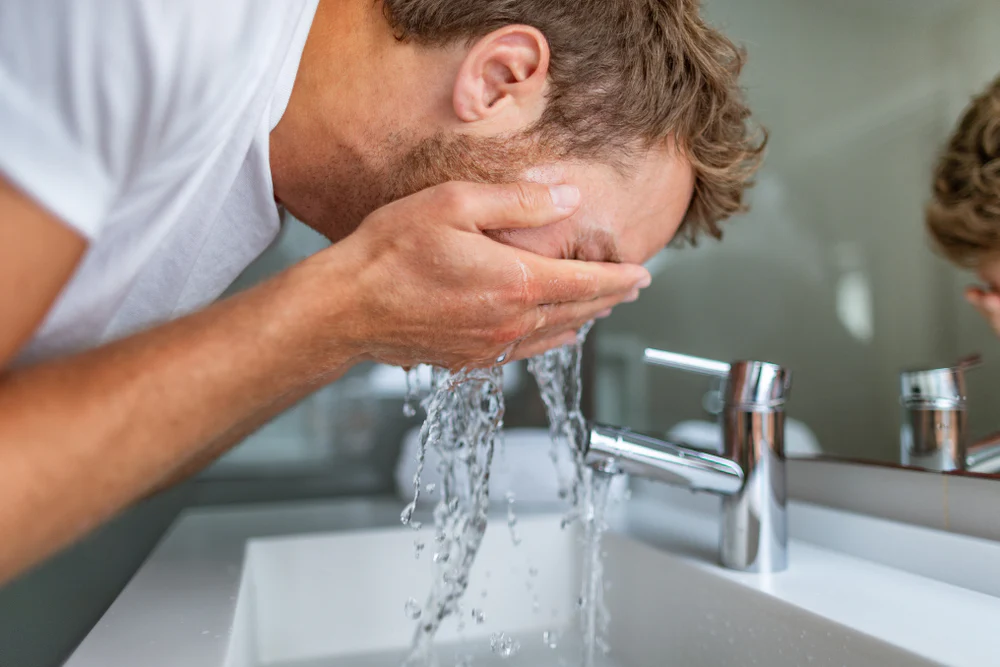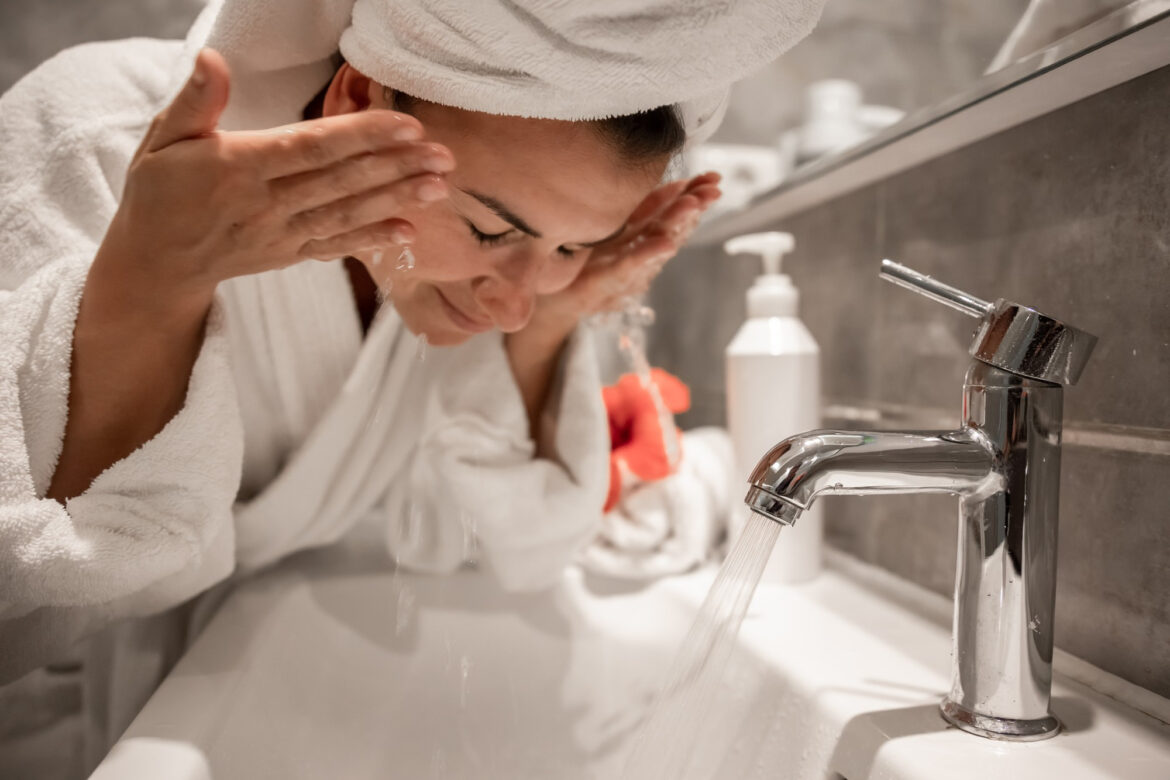Ever wonder if that refreshing splash of cold water in the morning is the best way to cleanse your face? Or maybe you’ve heard warm water opens up your pores for a deeper clean? The truth is, there’s no one-size-fits-all answer to the age-old question: Should I wash my face with cold water or hot water?
This guide dives into the pros and cons of both water temperatures to help you decide what works best for your unique skin type and needs. We’ll also explore some additional tips for a gentle yet effective face wash routine!
Table of Contents
ToggleUnderstanding Your Skin Type
Before we delve into water temperature, it’s important to understand your skin type. This will help you choose the right cleanser and overall approach to your face washing routine. Here’s a quick rundown of the four main skin types:

- Oily skin: This skin type tends to be shiny and prone to breakouts.
- Dry skin: Dry skin can feel tight, flaky, and sometimes itchy.
- Combination skin: This is a mix of oily and dry areas, typically with an oily T-zone (forehead, nose, and chin) and drier cheeks.
- Sensitive skin: Sensitive skin is easily irritated by harsh products or environmental factors.
Knowing your skin type will not only help you choose the right cleanser but also determine the ideal water temperature for washing your face.
Also Read: Stressed Skin? 8 Ways Your Skin Reacts to Stress and How to Help?
The Case for Cold Water: Refreshing and Toning
Washing your face with cold water can be incredibly refreshing, especially on a hot day. Here are some potential benefits of using cold water for cleansing:
- Toning effect: Cold water can help tighten pores, giving your skin a smoother appearance. This can be particularly appealing for those with oily skin.
- Reduced puffiness: Cold water can help constrict blood vessels, potentially reducing puffiness around the eyes.
- Stimulates circulation: A quick splash of cold water can give your face a temporary wake-up call and improve blood flow.

Keep in mind: Cold water might not be the best choice for everyone. While it can be invigorating, it might not be effective at removing makeup, sunscreen, or oil-based products.
The Warm Water Take: Effective Cleansing and Comfort
Washing your face with warm water can feel comforting and may be more effective for certain skin types. Here’s why some people prefer warm water:
- Effective cleansing: Warm water helps loosen dirt, oil, and makeup, allowing for a deeper clean. This can be beneficial for those with oily skin or who wear makeup regularly.
- Prepares skin for other products: Warm water can help open up pores slightly, allowing for better absorption of serums, moisturizers, and other skincare products.
- Gently soothes: The warmth can feel soothing on dry or irritated skin.

Be cautious: Excessively hot water can strip away natural oils from your skin, leaving it feeling dry and tight. This can worsen irritation, especially for those with sensitive skin.
Finding the Golden Ratio: The Ideal Water Temperature
So, what’s the verdict? Cold or warm? The answer, as with most things in life, is it depends! Here’s a general guide based on skin type:
- Oily skin: Lean towards warm water to remove excess oil and dirt. However, avoid very hot water.
- Dry skin: Opt for lukewarm water to avoid stripping away natural oils.
- Combination skin: You might benefit from a two-step approach. Start with warm water to cleanse, then finish with a splash of cool water to tighten pores.
- Sensitive skin: Lukewarm water is generally safest for sensitive skin.
Remember, these are just guidelines. Experiment and see what feels best and works most effectively for your unique skin.
Also Read: How to Get Rid of Redness from Pimples and Acne? A Comprehensive Guide
Beyond Temperature: Essential Face Washing Tips
Now that you know about water temperature, here are some additional tips for a gentle yet effective face wash routine:
- Choose the right cleanser: Look for a cleanser formulated for your skin type. For example, oily skin might benefit from a gel cleanser, while dry skin might need a creamier cleanser.
- Double cleanse (optional): If you wear makeup or sunscreen, consider double cleansing. First, use an oil-based cleanser to remove makeup and sunscreen, then follow up with your regular cleanser.
- Be gentle: Don’t scrub your face harshly. Use gentle circular motions and pat your face dry with a soft towel instead of rubbing.
- Moisturize: Always moisturize your face after cleansing, regardless of your skin type. This helps maintain hydration and keeps your skin healthy.

- Don’t overdo it: Aim to wash your face twice a day, in the morning and at night. Washing more frequently can disrupt your skin’s natural balance.
- Listen to your skin: Pay attention to how your skin reacts to your routine. If you experience dryness, irritation, or breakouts, adjust the water temperature, cleanser, or frequency of washing.
- Sunscreen is essential: Regardless of your face washing routine, wearing sunscreen every day is crucial for protecting your skin from harmful UV rays.
The Takeaway: A Happy, Healthy Face Wash Routine
Ultimately, the best face wash routine is the one that keeps your skin feeling clean, comfortable, and healthy. There’s no right or wrong answer when it comes to water temperature – experiment and find what works best for you. By understanding your skin type and following these simple tips, you can achieve a glowing complexion that reflects your inner health and confidence.
Bonus Section: Common Face Washing Mistakes to Avoid
We all make mistakes, and sometimes those mistakes can show up on our faces! Here are some common face washing faux pas to avoid:
- Using harsh soaps: Soaps can be very drying and irritating for your face. Stick to gentle cleansers formulated for facial skin.
- Using hot water: As mentioned earlier, excessively hot water can strip away natural oils and damage your skin’s barrier.
- Scrubbing too hard: Scrubbing can irritate your skin and cause inflammation. Be gentle and use circular motions.
- Forgetting to cleanse after sweating: Sweat can clog pores, so cleanse your face after exercising or sweating heavily.
- Not changing your washcloth regularly: A damp washcloth can harbor bacteria. Change your washcloth every few days or use disposable cleansing wipes.
- Neglecting your neck: Your neck is part of your face too! Cleanse your neck along with your face for a more complete clean.
- Skipping moisturizer: Moisturizing is essential for all skin types. Find a moisturizer that suits your needs and apply it regularly.
By avoiding these mistakes and following the tips outlined in this guide, you can set yourself up for a successful and healthy face wash routine that keeps your skin happy and glowing!
Should You Wash Your Face With Cold Water or Warm Water? – FAQs
This FAQ dives deeper into questions you might have about finding the perfect water temperature for your face wash routine:
1. Isn’t cold water better for shrinking pores?
Cold water can have a temporary tightening effect on pores, making them appear smaller. However, pores don’t actually open and close. They are there to allow oil and sweat to escape the skin. While cold water might minimize their appearance for a short time, it won’t permanently shrink pores.
2. If I have oily skin, should I use hot water to remove excess oil?
While it seems logical to use hot water to remove oil, it can backfire. Excessively hot water can strip away natural oils, which can actually trigger your skin to produce even more oil to compensate. Stick with lukewarm water and a cleanser formulated for oily skin for a more effective cleanse without disrupting your skin’s natural balance.
3. I wear makeup every day. Does that change the water temperature I should use?
If you wear makeup, it’s a good idea to double cleanse, regardless of your skin type. First, use an oil-based cleanser to gently remove makeup and sunscreen. Then, follow up with your regular cleanser and lukewarm water to remove any remaining residue.
4. Can cold water help reduce redness on my face?
Cold water can help constrict blood vessels, potentially reducing the appearance of redness. This might be helpful if you have a sunburn or rosacea. However, it’s important to address the underlying cause of redness with proper skincare and consult a dermatologist if needed.
5. Is it okay to wash my face with cold water in the morning and warm water at night?
Absolutely! You can experiment and see what works best for you at different times of the day. A cool splash in the morning can be invigorating, while warm water at night might feel more soothing before bed.
6. What if my skin feels tight after washing my face?
This could be a sign that your cleanser is too harsh or the water temperature is too hot. Try switching to a gentler cleanser and lukewarm water. You might also benefit from using a moisturizer specifically formulated for your skin type.
7. I have sensitive skin. What should I do?
For sensitive skin, it’s best to avoid extremes. Stick with lukewarm water and a fragrance-free, gentle cleanser designed for sensitive skin. Patch test any new product on a small area of your face before applying it all over to check for any irritation.
8. Is micellar water a good alternative to washing my face with water?
Micellar water can be a refreshing way to remove makeup and cleanse your face, especially if you have sensitive skin or are on the go. However, it typically shouldn’t replace your regular face wash routine with a cleanser and water. Micellar water might not be as effective at removing oil and dirt buildup, especially sunscreen.
9. Is it bad to wash my face with just water?
Water alone might not be enough to remove makeup, sunscreen, oil, and dirt buildup effectively. Using a gentle cleanser formulated for your skin type is generally recommended for a thorough cleanse.
10. Should I wash my face in the shower?
Shower steam can help open your pores, potentially allowing for a deeper cleanse. However, be mindful of the water temperature. Avoid very hot showers, and if you use harsh shower products, they might irritate your face. Consider cleansing your face separately at the sink with lukewarm water and your chosen cleanser.
